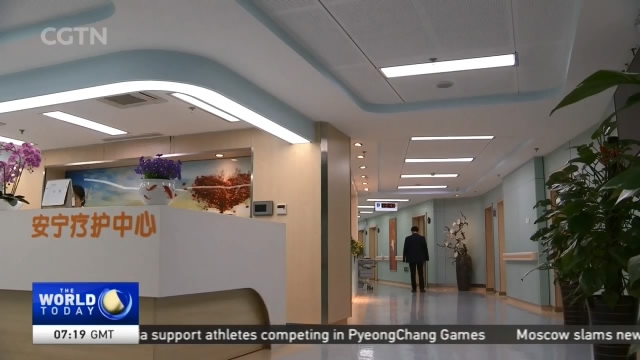
15:43, 04-Feb-2018
World Cancer Day: China's growing awareness in palliative care

Palliative care in China is still at its nascent stage, with the Economist Intelligence Unit having ranked China 71st out of the 80 countries it surveyed under its 2015 Quality of Death Index. Aside from the said cultural stigma, access to hospice care and government funding are also limited. However, there are signs that public awareness and acceptance are growing. Our reporter Wei Lynn Tang takes us through her visit to a general hospice care center.
Grandpa Li is over 80 years old. He used to work for a multinational company, and recalls having a good life.
A prostate gland cancer patient for three years, he now spends his days at the hospice care centre at Peking University Shougang Hospital, listening to music on his iPad, buying things online almost like an average Joe.
GRANDPA LI CANCER PATIENT "Coming into this world, growing old, falling sick, and dying, they are all part of life. I have already lived until 84, and have no regrets."
Grandpa Li says he is not scared of dying, but rather, he is afraid of being in pain.
YIN JING, NURSE HOSPICE CARE CENTER, PEKING UNIVERSITY SHOUGANG HOSPITAL "Presently there is no curative treatment for Grandpa Li's type of cancer, so the approach is to reduce the pain and symptoms of the disease."
Yin says as the country's cancer rate increases, so has the awareness level, citing volunteers coming by to accompany the patients, or nearby university students who come to play pretend-grandchildren.
There is a meditation room at the hospice care center where volunteers, regardless of religion, congregate twice a week to spread love to the patients.
Mr. Wang, whose 62-year-old wife has late-stage colon cancer, says his wife has accepted her condition and just wants to have a good quality life, for as long as she still can.
MR. WANG HUSBAND OF WIFE WHO HAS CANCER "My wife was the one who suggested we come here and take a look. Before this we never understood much about end of life care. The doctors are different, they will first ask for the patient's opinion before treating you. It is almost, as if they understand the patient's state of mind, and want to appease them."
WEI LYNN TANG BEIJING "We often hear the phrase: quality of life. But what about the quality in one's death? It is something we tend to kick down the road until its discussion becomes unavoidable. A new study shows there were over 4 million new cancer cases in China in 2015, with almost 3 million in cancer-related deaths the same year. Yet it's estimated that only less than one percent of the country's hospitals provide palliative care."
This grade-three hospice care centre, the highest level for a general hospital, is China's very first, and was established in March last year -- just when the country released a set of standards for palliative care.
It has 14 rooms (and beds), 10 nurses, 4 doctors.
The balcony walkway outside the patients' rooms are filled with plants and sunlight, a place for them to gather, play some games, and self-cultivate.
HU LEI, HEAD NURSE HOSPICE CARE CENTER, PEKING UNIVERSITY SHOUGANG HOSPITAL "In the face of death, many will have their own resentments. While most of the cancer patients who come here have already accepted their condition, there are also some who are still in a state of anxiety. As such, we adopt an individualized treatment for each patient. Our hope is that under our help, every patient can go through their end-of-life phase as positively as possible."
Hu Lei adds, palliative care in China is still in its early stage, with the concept and details of it still being developed.
And while the Economist Intelligence Unit has listed China as a country with high demand but with poor provisions for palliative care, it appears that at least some parts of the country, are slowly warming up to this concept. WLT, CGTN, Beijing.

SITEMAP
Copyright © 2018 CGTN. Beijing ICP prepared NO.16065310-3
Copyright © 2018 CGTN. Beijing ICP prepared NO.16065310-3